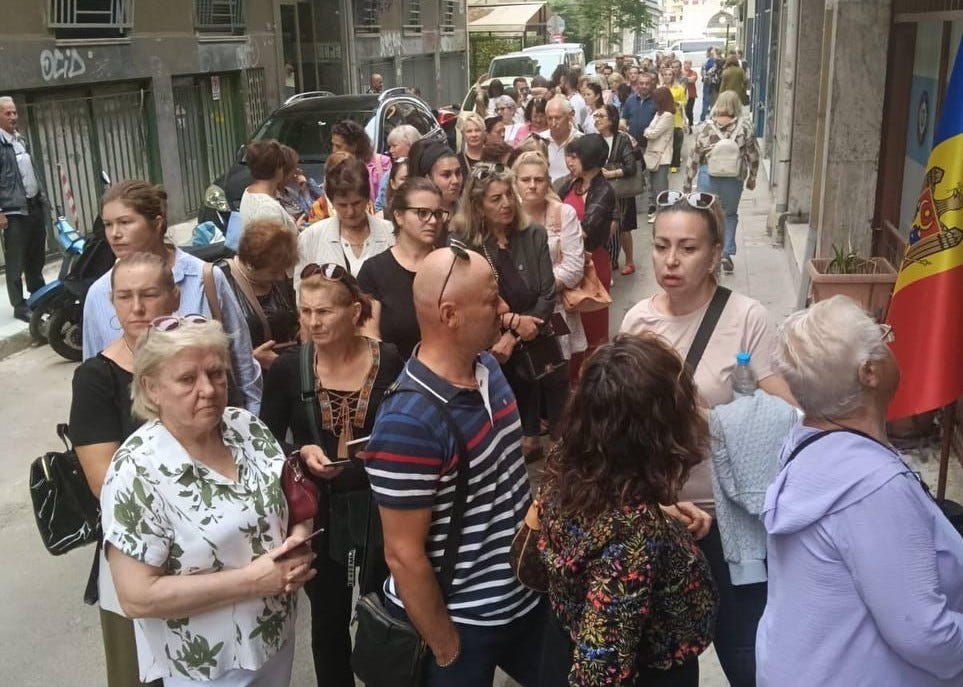🗳️ Moldova Votes Under Siege: Europe’s Next Flashpoint?
With ballots cast in a pivotal pro-EU vs. pro-Russia showdown, Sandu’s party faces Kremlin interference, economic grievances — as Moscow escalates drone attacks on Ukraine and even NATO skies
Moldovans began voting in key parliamentary elections facing a choice of two paths: continuing toward joining the European Union or veering toward Russia amid widespread reports of campaign meddling by the Kremlin. Polls opened at 7 a.m. local time on September 28 in an impoverished country with a front-row seat to Russia’s war in neighboring Ukraine. The Central Electoral Commission reported that 750,000 people, or just more than a quarter of eligible voters, had cast ballots by 1 p.m. Polls close at 9 p.m. with results expected to flow in soon afterward. The conflict, Europe’s largest and deadliest since World War II, has hit Moldova’s economy hard, disrupting trade and driving up energy prices to trigger a spike in inflation. Meanwhile, the Kremlin’s online army of disinformation bots has used fake accounts and networks, often AI-generated, to flood social media with pro-Russian narratives and unsubstantiated claims of fraud. The contest pits President Maia Sandu’s ruling Action and Solidarity party (PAS) against the Patriotic Electoral Bloc, an alliance of pro-Russian, Soviet-nostalgic parties. The Socialists are led by Igor Dodon, a former Moldovan president whom Sandu defeated in a 2020 presidential election and who has long maintained close ties with Moscow. He has referred to the current democratically elected government as a “criminal regime.” The Kremlin has repeatedly accused Moldova of “anti-Russian hysteria” and has denied it is interfering in what Sandu has called the “most consequential election” in her country’s history. Heightening tensions, Moldovan police and prosecutors on September 22 detained 74 people on suspicion of preparing mass unrest. The groups was reportedly trained in Serbia -- a key European ally of Russia -- in destabilization tactics. The days preceding the elections also marked the exclusion of two pro-Russian parties -- the Heart of Moldova and Moldova Mare (Greater Moldova) -- from participating in this weekend’s vote. Moldova’s election authority imposed the restrictions following searches that led to allegations of voter bribery, illegal party financing, and money laundering - RFE/RL
Citizens will elect 101 members of parliament for four-year terms. Twenty-three candidates are participating in the race: 15 parties, four electoral blocs, and four independent candidates. The Central Election Commission approved a list of 301 polling stations opened in 41 countries. By 10:50 AM BST, 25% of voters on the electoral rolls in Moldova had cast their ballots. For the elections to be valid, a third of the electorate must participate, Newsmaker. Md reported.
Voters and officials were rushed out of the Moldovan embassy in central Brussels on Sunday after reports were received of a bomb in the building, which proved to be false. Two officials, granted anonymity to speak to POLITICO, confirmed that the embassy had been evacuated following the alert, and that police had found no evidence of a threat. Thousands of Moldovans living in the Belgian capital have been casting their ballots through the day at an overseas polling station set up in the diplomatic mission. “These are the same tactics we have warned about — voter suppression,” said one of the officials following the evacuation.
Voting has since resumed at the embassy after it was given the all-clear by authorities - Politico
Telegram founder Pavel Durov reportedly stated that French intelligence services had approached him with a request to assist the Moldovan government in censoring several Telegram channels ahead of the 2024 presidential elections. He is said to have refused. “Telegram is committed to freedom of speech and will not remove content for political reasons,” Durov was quoted as saying - Newsmaker.Md
Russia launched hundreds of drones and several dozens missiles early on September 28 in a massive air attack on Ukraine, killing at least four people and injuring 70, and inflicting damage to civilian infrastructure. Ukrainian President Volodymyr Zelenskyy said some 500 drones and 40 missiles were fired at several regions, hitting targets such as an industrial bakery, a tire factory, houses, and apartment buildings. Kyiv Mayor Vitaliy Klitschko said a medical facility and a kindergarten were also struck. He added that a fire had also broken out at a gas station due to falling debris. The attack on Ukraine on September 28 also injured dozens in the country’s major southern city of Zaporizhzhya. At least three of them are children, regional Governor Ivan Fedorov said. “Forty-one apartment buildings, 22 houses, and several nonresidential structures were damaged as a result of the enemy attacks,” Fedorov added. Russia’s Defense Ministry claimed it had carried out the attack to target Ukraine’s military infrastructure. Russian officials have repeatedly denied targeting civilian sites, despite mounting evidence to the contrary - RFE/RL
The Danish defense ministry said Sunday it had again observed drones at several of its armed forces’ locations overnight, a day after NATO announced it would enhance its vigilance in the Baltic Sea region. The ministry said in a statement it had “several capacities deployed” after drone sightings from Saturday into Sunday night. It didn’t offer any further details about the specifics of the deployment, the number of drones or locations. This is the latest unexplained drone activity after several sightings, including over five Danish airports last week, raising concerns about security in northern Europe amid suspected growing Russian aggression. Following a NATO meeting in Riga, Latvia, on Saturday, Colonel Martin O’Donnell, the Supreme Headquarters Allied Powers Europe spokesperson, announced that “we will conduct even more enhanced vigilance with new multi-domain assets in the Baltic Sea region, which includes Denmark, under Baltic Sentry.” He also said NATO leaders were in constant contact with Danish officials following the drone sightings. As Denmark gears up for the upcoming European Union Summit in Copenhagen, the Danish transportation ministry said Sunday that “all civilian drone flying in Danish airspace will be prohibited” from Monday to Friday to “remove the risk that enemy drones can be confused with legal drones and vice versa.” - AP
Vladimir Putin reportedly has a £105m love nest in the French Riviera with his gymnast mistress Alina Kabaeva. Russian tycoon, Shalva Chigirinsky, 76, claims he sold the sprawling property on the Cote d’Azur in 2009 when it was snapped up by a “serious shark” believed to be representing the Kremlin ruler. The much younger Olympic gold medallist gymnast Alina Kabaeva, 42, has allegedly been Putin’s clandestine partner for the past 18 years, despite the 30-year age gap. Rumours of the affair between then-married Putin and Kabaeva emerged a year before the villa was bought. Since his public divorce in 2013, Putin has forbidden any coverage of his private life. The Villa del Mare, with its own bunker, is in the elite Roquebrune-Cap-Martin - and it is now a frozen asset amid a long-running French money laundering probe. Set along the coast, images show that the sumptuous villa has a large swimming pool. After he sold the sprawling villa estate, Kabaeva was a regular visitor there, as testified by servants and security guards, a source said - Express
U.S. President Trump will meet with the four top congressional leaders at the White House on Monday, the day before a deadline to avert a government shutdown, the lawmakers said. Congress faces a Tuesday deadline to fund the government, which will require lawmakers to agree on a spending measure that can win at least 60 votes in the Senate. But Republicans control only 53 seats and need support from Democrats, who have been demanding that G.O.P. leaders and Mr. Trump negotiate with them. But even as leaders of both parties agreed to a meeting, it was unclear whether Mr. Trump intended to reach a bipartisan compromise or if he was summoning Democrats to press them to accept Republicans’ funding proposal. Republicans have been trying to advance a temporary funding bill, known as a continuing resolution, or C.R., that keeps federal spending levels flat. Such measures have become routine on Capitol Hill to avoid shutdowns, and Republicans have pointed out that they repeatedly agreed to such bills in the past - NYT
A government shutdown could disrupt travel with longer lines at the airport, national park closures and snarled itineraries. Nonessential federal operations would cease at midnight on Tuesday if Congress fails to pass legislation to keep the government functioning. Many airport employees, including air traffic controllers and Transportation Security Administration staff, would be forced to work without pay. The New York Times reported that though transportation systems, including air and rail, would continue to operate, a shutdown could bring financial losses of up to $1 billion each week for the country’s travel economy and heighten “uncertainty in our travel system,” said Geoff Freeman, the president and chief executive of the U.S. Travel Association, a trade group that promotes travel to and within the country.
Students from Saudi Arabia are increasingly turning away from US universities in particular, put off by a mix of hostile immigration policies, concerns over gun violence, and the kingdom’s own push to grow its domestic education sector. Many are also drawn to staying home during a period of rapid transformation, where teenagers are trying to “Make Arabic Cool Again” and enjoying freedoms that Saudis once had to travel abroad to find. Saudi Arabia will need to increase higher education capacity by 40% by 2030 (more than 60% of Saudis are under the age of 30), and to help meet that demand, the government has held discussions with universities in the US, Australia, Spain, and some Asian countries to bring campuses to the kingdom, an official at the Royal Commission for Riyadh City (RCRC) — which is tasked with developing the capital and enhancing education across the kingdom — told Semafor. Private investors are also eyeing the space, aiming to replicate peers in the Gulf. Abu Dhabi has New York University, Qatar’s Education City hosts Cornell, Carnegie Mellon, and Georgetown, and Dubai plans to open an outpost of the University of Pennsylvania’s medical school in 2027. Riyadh is positioning itself as the next hub. While Saudis students will make up the bulk of future demand, foreign students may also help fill classrooms. With more expats moving to Saudi Arabia, many families would consider branches of US and European universities, said the RCRC official, who declined to be named because she wasn’t authorized to speak to the press. Keeping more consumer spending in the kingdom is an important element of Saudi’s economic diversification strategy.





